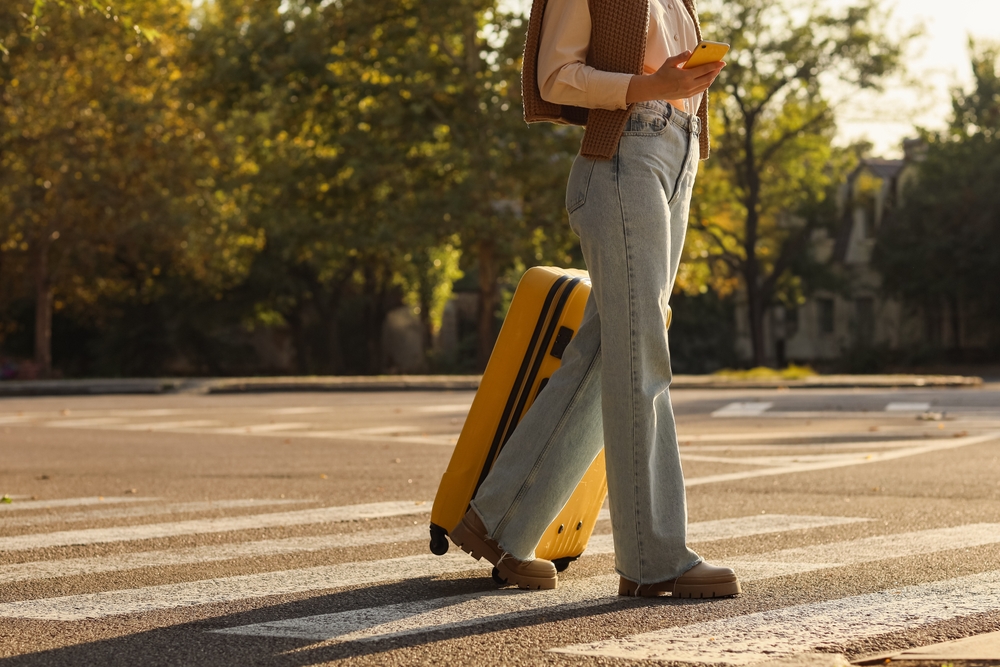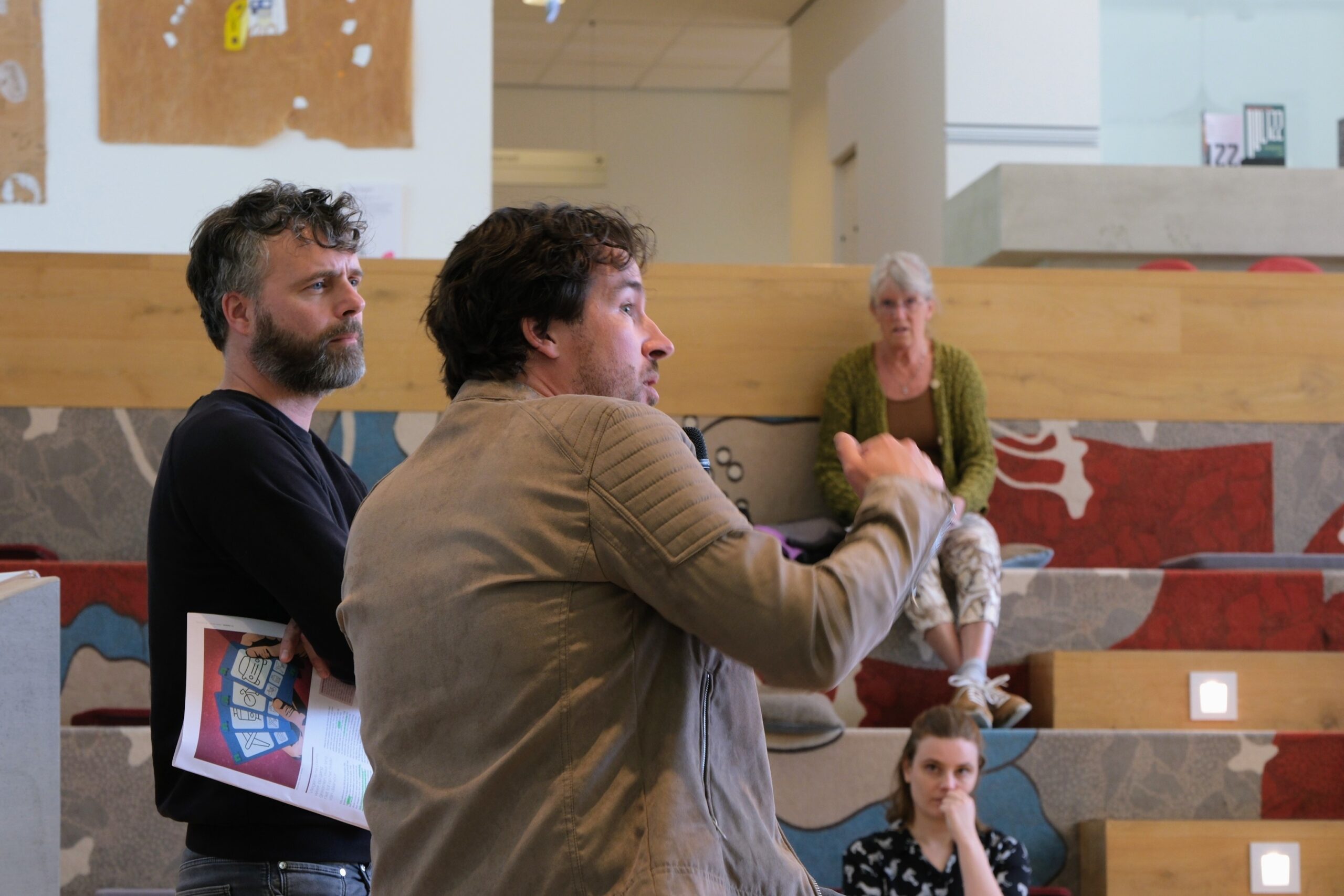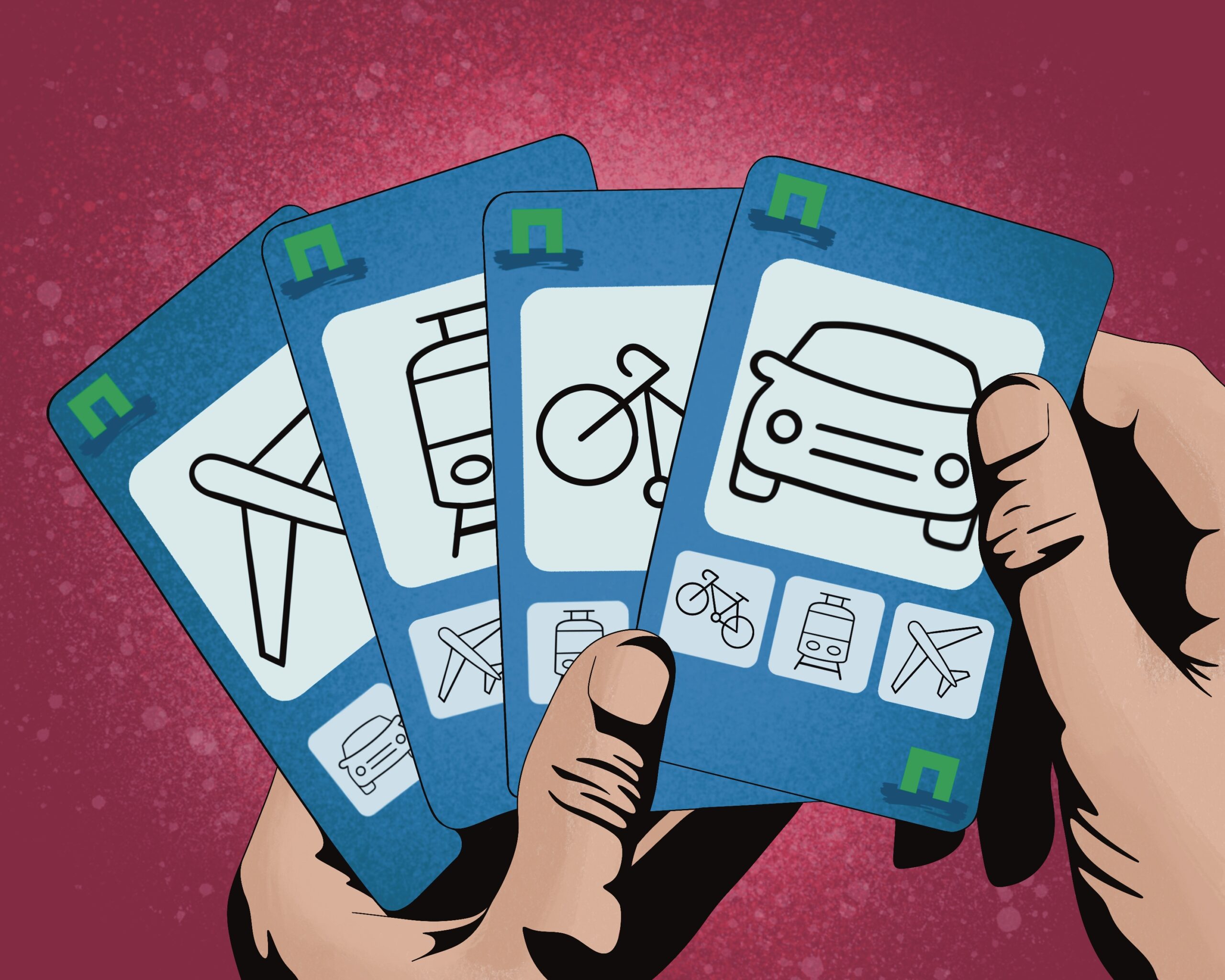On an excursion to Lithuania, students protested against the policy on flying. Student editors Felix Landsman and Maurice Schoo asked around the different disciplines to gauge opinions on WUR’s travel policy.
With students from 113 countries and research projects all around the world, WUR is an international player. So many of the degree programmes run excursions on which students can get an idea of what it’s like to work abroad. And flying is a key means of transport on such excursions. Bachelor’s students of Environmental Sciences (BES) who take the International Study Visit course, for example, go for a week’s work experience and can choose between France, Latvia and Lithuania. They fly to Latvia and Lithuania, or go by bus to France. For some years, students on the MSc in Development and Rural Innovation (MDR) have been going to the Spanish island of Majorca for a week for the compulsory course Cutting Edge Issues in Development and Rural Innovation. There are no clear-cut rules. The WUR policy only states: ‘Travelling – especially flying – is environmentally damaging due to greenhouse gas emissions.’ Resource paid a visit to these degree programmes to ask ‘isn’t it time this changed?’
Hypocritical
At BES there were three students who disagreed with the flying policy. Inger-Marie Smid, Sofia Setten and Stefano Bisello were supposed to fly to Lithuania but undertook a 28-hour Flixbus trip instead. They slept in a hostel in Warsaw en route. ‘We study Environmental Sciences and then we fly? That’s like being a vegan butcher,’ says Stefano from Italy. ‘It’s just hypocritical.’ Sofia from France thinks it’s strange that ‘we don’t practise the things we learn on our Bachelor’s ourselves.’ She thinks it is bad that WUR does nothing about this. ‘We’ve really got to change the way we travel,’ she says. Stefano thinks a trip like this has a negative effect on students’ later mindset. ‘You think that BES students learn about policy and technologies in order to save the environment, but when there’s a chance to actually do something, they don’t do anything. What do you expect they’ll do in the future, then?’
Personal choice
On the Master’s in Development and Rural Innovation, an alternative to flying to Majorca is offered. At the start of the course, students can indicate whether they want to fly or travel some other way. If they take the latter option, the students do most of the organizing themselves. Belgian MDR student Douwe de Vestele: ‘We wanted a say about our journey because it was going to take us about three days. In the end we were given a budget within which we could choose our means of transport ourselves.’
The plane goes even if we’re not on it so the emissions don’t change
The choice fell on travelling by Flixbus to Paris via Utrecht, and on to Barcelona by train. ‘We slept in a hostel in Barcelona and then took the early morning ferry to Palma, Majorca,’ says Douwe. The climate was not the only reason for travelling this way. ‘I thought it would be nice to make the alternative journey – a fun adventure,’ says Indonesian student Kevin Aditya Prathama. ‘Tiring as the alternative option was, I wouldn’t have wanted to miss it,’ says Hilde Nijland. She too is on the MDR and took the alternative transport on the outward journey but flew back. ‘I would recommend the alternative, though.’ There proved to be plenty of interest in the alternative. 10 out of the 22 students chose not to fly.
Yutaro Minohara from Japan did opt to fly. ‘Personally, I didn’t really consider the alternative. The excursion itself was very tough and the extra travel might have been too much. Anyway, the plane goes even if we’re not on it so the emissions don’t change.’
Sacrifice
At BES there was less support for the sustainable transport alternative taken by three students. Not that they were resistant to the idea, according to Inger. ‘We messaged the WhatsApp group to say we wanted to go by bus and some people were interested. But the course coordinator sent an email to us all saying that if you arrived late, you probably wouldn’t pass the course. That put a lot of people off.’ And did they arrive late? ‘No, a day early in fact.’
According to Stefano, some of the other students reacted ‘a bit defensively’. Inger got the same feeling: ‘probably because they thought we were taking the moral high ground.’ Some were also very convinced that flying was efficient. Inger: ‘They thought we were being a bit ridiculous, sacrificing two weekends of our lives to make a point.’
The teacher who led the excursion to Lithuania was not available for comment for work reasons. Karen Fortuin, education coordinator of the chair group that teaches that course, and BES programme director Marjo Lexmond, took a positive view of the three students’ initiative ‘We teach our students to think critically so I think it’s good that they are critical of a trip like this. Students certainly ought to question whether it’s really necessary,’ says Lexmond.
Highlight
After giving it much thought, for the time being the programme is sticking to the decision to take the plane. Fortuin: ‘The course aims to give the students experience of an international learning environment, and it’s an important moment for the degree programme. You must look beyond the Netherlands, Germany and Belgium if you really want an international programme.’
Lexmond agrees with this: ‘Most BES students are Dutch, so for them the Netherlands is home territory. The combination of going abroad and working with local people is important to us.’ According to Fortuin and Lexmond, most students are positive about the excursions too. ‘For many of them, it’s the highlight of their degree,’ says Fortuin.
The international angle is important for the MDR too. There are a lot of international students on this Master’s programme, which focuses mainly on the countries of the Global South. These are not just down the road. ‘So many MDR students go abroad for their thesis work. Majorca is a kind of try-out, with a different language and culture and different customs,’ says course coordinator Eva Meijer. ‘The importance of the Majorca excursion is to put theory into practice there. Field work in the social sciences is something you really have to experience. It’s not just about conducting interviews and observations; your own impressions count too.’ A great many themes related to the degree affect the island: climate change, tourism, agriculture and rural depopulation. ‘That makes it a relevant place,’ she says.
Never again?
To Meijer, it is important that an alternative to flying is available. ‘But it does mean extra work for me. For the university, flying is still the easiest way to travel.’ That is partly because the arrangements are made by an external travel agent, which doesn’t offer many other options. And for Majorca there’s an added problem: ‘The boat to the island isn’t included in the contract. Plus, you can book flights far in advance, but that’s harder with trains and buses.’
Organizing this trip is a long process that starts in February. So this is a logistical nightmare
Organizing the trip is a big issue for the Bachelor’s course too. In one period students sometimes go to three different destinations, and what is more, the trip is hemmed in by another course, which means there is not much travel time available. Another question is to what extent students’ individual wishes can be met at the expense of the teachers’ workload.
Programme director Lexmond: ‘Organizing this trip is a long process that starts in February. So this is a logistical nightmare.’ The planning leaves little scope for alternatives such as that of the three students. ‘We already have three destinations to choose from, so do we also have to offer different travel options within that? There are limits to what’s possible.’
Is a flying ban an option? That would certainly raise new questions, says Lexmond. ‘We stick to WUR’s overall travel policy. We don’t promote flying, but rigidly banning something – it doesn’t work that way either. The decision to fly to countries like Lithuania and Latvia really wasn’t taken lightly. If we’re never allowed to fly on account of the degree programme, does that mean we don’t want international students anymore? They fly in too!’
Less strict
So for now air travel will continue for BES students. It turns out to be quite difficult to change that. There are plans to take steps in that direction, though: ‘We are overhauling the BES and that includes attention to this issue. There is a preference for not needing to fly,’ says Lexmond.
And for the MDR, a discussion has got going as to whether Majorca is a sustainable venue for the excursion. Student Douwe is clear on this point: ‘Personally, I think Majorca is a bit over the top. I get that the excursion goes abroad so you get out of your comfort zone, but that could also be a destination that’s easier to reach by train or bus.’ Hilde adds: ‘I thought it was very contradictory to go to the island, especially given that our programme is very critical of tourism there.’ But Kevin is a bit less strict about that: ‘A different destination would probably be just as enriching. But the island is a nice place to go to and I think it’s a highlight of the programme for everyone.’ Yutaro confirms that: ‘The week brought the students closer together and it makes the issues a lot clearer than they are when you study them on campus. But of course, that would be possible at another destination too.’
A different destination
This remains a thorny issue for coordinator Meijer: ‘If necessary, we’ll pick a different destination, but I don’t know what’s the answer to this yet. It would be very time-consuming to set up the course around a new excursion venue. Where do you find new contacts, for instance? Where are we going to stay? We have worked intensively with our contacts in Majorca, and then we’d say goodbye to them. On the other hand, we have been to other destinations in the past.’
‘For now I do think there should always be a sustainable alternative,’ says Meijer. And student Kevin agrees: ‘There should be an alternative from the start, and it should be supported by WUR. It shouldn’t be something students have to come up with themselves.’ But for Douwe, that’s still too non-committal: ‘If it was up to me, the alternative would be the norm, meaning that a trip is overland if, say, that’s possible within a certain timeframe. Of course you can always make exceptions for people for whom it’s difficult to travel that way. But if WUR wants to be the most sustainable university in the world, they should do this too.’
More critical
With the help of a Student Council member, the BES trio is trying to change the travel policy through the Student Charter. ‘At the moment there is nothing binding about the travel policy,’ sighs Sofia, ‘but hopefully we can improve that.’ If it’s up to these three, flights will only be taken if the destination cannot be reached overland. The bus or train should be the default option. ‘WUR should be more critical of why a trip has to be undertaken in the first place,’ thinks Sofia.

 ‘We study Environmental Sciences and then we fly? That’s like being a vegan butcher’, says one of the students. Illustration Valerie Geelen
‘We study Environmental Sciences and then we fly? That’s like being a vegan butcher’, says one of the students. Illustration Valerie Geelen 

